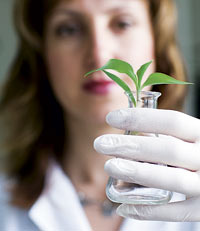FSA accused of helping GM industry

The government’s food safety watchdog has been accused of spending £500,000 on a PR exercise on behalf of the GM crop industry.
Helen Wallace, director of campaign group GeneWatch UK, has resigned from a Food Standards Agency steering group tasked with shaping and managing a public dialogue on food and the use of GM technology.
Dr Wallace said evidence unearthed through Freedom of Information requests had convinced her that the “FSA process was set up from the outset to provide free “reputation management” to the GM industry at taxpayers’ expense”.
In a resignation letter she said: “The FSA appears to actively engaged in trying to use the so-called dialogue to implement the industry’s PR strategy: focusing on a non-existent positive future where new GM crops will ‘feed the world’, whilst lobbying to end the segregation of GM and non-GM food and feed entering Britain and Europe, and opposing the labelling of meat and dairy products produced using GM feed.”
The FSA set up the steering group to organise a public dialogue on the use of genetic modification.
It wants to find ways to discuss with members of the public their understanding of GM in food and what they think are its potential risks and benefits.
The dialogue will also allow the FSA to identify what information people need and want in order to make confident, informed choices about the food they eat.
Dr Julian Little, chair of the pro-GM Agricultural Biotechnology Council accused GeneWatch of using its withdrawal as a PR stunt to scaremonger and promote unfounded myths.
“Food security is a global issue and one that the UK cannot turn its back on. We need to increase food production in a sustainable way and we should all be working together to find the best solutions, rather than have tit-for-tat arguments that are not addressing the pressing public policy challenges we face.
“We stand by the need for GM to be presented as an option within the wider context of food security as part of the solution to a growing population.
“With that in mind, we look forward to the day when consumers are able to vote with their wallets on this subject and when farmers are able to access the tools they need to produce high quality affordable food in the face of climate change and resource depletion.”

